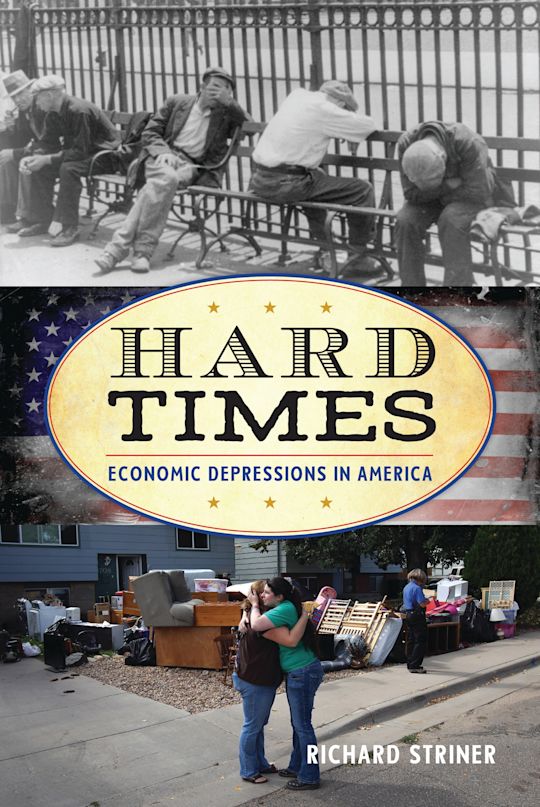- Home
- ACADEMIC
- History
- United States History
- Hard Times
For information on how we process your data, read our Privacy Policy
Thank you. We will email you when this book is available to order
You must sign in to add this item to your wishlist. Please sign in or create an account
Description
Hard Times presents a comprehensive account of economic depressions in America, from colonial times to the “great recession” that began in 2008. Written in crisp prose for a general audience, the book synthesizes a narrative account—presenting the known facts about how particular depressions started, the effects upon people in different walks of life, the policy debates about what (if anything) to do in order to ameliorate the situation, and how these depressions ended—with analytical commentary on the economic patterns underlying and transcending depressions and the debates among economists and policymakers in regard to their causes. While these economic downturns have created suffering and hardship, Striner also conveys how Americans have always endured and rebounded from hard times.
Table of Contents
Acknowledgments
Introduction
Chapter 1: Hard Times from Colonial to Postrevolutionary America
Chapter 2: Hard Times and the Financial Panics of 1819 and 1837
Chapter 3: The Panics of 1873 and 1893–And Hard Times in Between
Chapter 4: Depressions and Policy Disputes in America, Circa 1720–1928
Chapter 5: The Onset of the Great Depression
Chapter 6: The Early New Deal and the Depression
Chapter 7: 1934–A Year of Fear and Rage in America
Chapter 8: The Politics of Class Conflict During 1935 and 1936
Chapter 9: Recovery and Recession, 1937–1939
Chapter 10: The Great Depression and American Culture in the 1930s
Chapter 11: How the Great Depression Ended: The Keynesian School of Thought
Chapter 12: The Revolt Against Keynes
Chapter 13: The Great Recession
A Note on Sources
Index
About the Author
Product details
| Published | Aug 15 2018 |
|---|---|
| Format | Hardback |
| Edition | 1st |
| Extent | 234 |
| ISBN | 9781442253230 |
| Imprint | Rowman & Littlefield Publishers |
| Illustrations | 11 b/w photos |
| Dimensions | 9 x 6 inches |
| Publisher | Bloomsbury Publishing |
About the contributors
Reviews
-
In this concise overview of economic depressions in the United States, Striner, a professor of history at Washington College, highlights the boom-and-bust nature of economic growth, paying special attention to the role of financial panics in precipitating economic contractions. Striner begins in colonial times and covers the bank wars of the antebellum period and the tide of populist anger embodied by the “Greenbackers,” who advocated increasing the country’s money supply with non-gold-backed currency, before devoting three chapters to the Great Depression and its lessons. The final section sketches an intellectual history of the two major schools in economic thinking—Keynesianism and monetarism—before concluding with reflections on the Great Recession of 2008, which, he writes, “began... in much the same manner” as previous economic disasters, with ill-conceived practices in the financial sector. Striner is a lucid guide to economic history, explaining fractional reserve banking and the workings of financial panics with ease. He keeps innovations in money and banking at the heart of the narrative, lending it analytical heft.... [T]his intelligent and scrupulous account imparts a detailed knowledge of U.S. depressions and the political and economic responses they generated.
Publishers Weekly
-
Using a light touch in his unbinding of economic theory, Striner makes the abstruse accessible to the layman.
Booklist
-
“Richard Striner reminds us that hard times--economic contractions often rooted in financial excesses--have punctuated America's otherwise remarkable economic progress for more than three centuries. Especially useful is his in-depth account of the Great Depression decade of the 1930s, which few alive today experienced, and its comparison with our recent Great Recession. Striner invites us to think seriously about how best to soften the bad effects of hard times.”
Richard Sylla, New York University
-
“In this lively narrative survey, Richard Striner introduces readers to the history of ‘hard times’--panics, recessions, and depressions--in America from the colonial period to the present day. Broad in conception and sweep, Hard Times covers both the economic and social dimensions of periods of economic difficulty, as well as the varied ways in which the government responded to ‘hard times’ and the reasons why. Striner’s thoughtful book is a valuable addition to the literature.”
Peter Coclanis, University of North Carolina at Chapel Hill


































